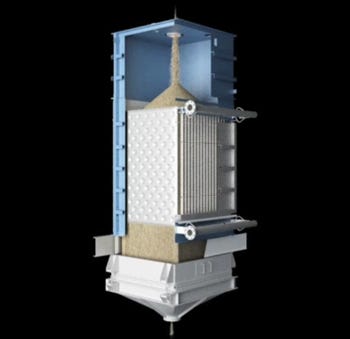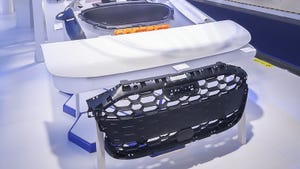Energy-efficient heat is on for plastics processors at Solex
Materials suppliers have been the traditional customers for Solex Thermal Science (Calgary, AB, Canada), a developer of heat-transfer systems for bulk solids, "but we have noticed a budding application for preheating and regulating the temperature of polymer powder and pellets among extruders," says Kevin Harris, engineer and Senior Sales Manager.
June 17, 2015
Materials suppliers have been the traditional customers for Solex Thermal Science (Calgary, AB, Canada), a developer of heat-transfer systems for bulk solids, "but we have noticed a budding application for preheating and regulating the temperature of polymer powder and pellets among extruders," says Kevin Harris, engineer and Senior Sales Manager. He explained his company's technology and why it might benefit plastics processors during a Center Stage presentation today at Plast-Ex in Toronto.
"We have seen some interest coming from plastics processors in Canada, especially. Maybe it has something to do with colder climates," Harris told PlasticsToday. "In any case, we're trying to see if there isn't an opportunity for us."
 Controlling the temperature of polymers is a critical aspect of plastics processing. Solex technology achieves this with a unique heat-transfer technology that applies proprietary modeling software, the "secret sauce," as Harris calls it, to accurately predict product temperatures during the heating or cooling process and ensure optimal thermal performance.
Controlling the temperature of polymers is a critical aspect of plastics processing. Solex technology achieves this with a unique heat-transfer technology that applies proprietary modeling software, the "secret sauce," as Harris calls it, to accurately predict product temperatures during the heating or cooling process and ensure optimal thermal performance.
Suited for degassing and polymer conditioning, Solex's indirect cooling and heating technology is practically free of emissions. The slow, controlled movement of polymers, which do not come into contact with cooling or heating media, through the heat exchanger prevents product degradation, adds Harris.
The system has no moving parts, minimizing maintenance, and the stainless steel plates are easily accessed via a large door for cleaning, removal and isolation, if needed.
Compared with conventional rotary drum or fluid bed techniques, Solex technology does not require investments in auxiliary equipment, says Harris, and it can achieve dramatic reductions in energy costs. The unit's vertical design results in a small footprint, and the system can be easily upgraded to meet increased capacity requirements.
The company offers free testing of bulk solids at its in-house laboratory to determine optimal plate spacing for a given application. Pilot testing at customer sites is also available for a nominal fee.
Solex Thermal Science is exhibiting at booth 2133 at Plast-Ex, which runs through June 18, 2015, at the Toronto Congress Centre.
About the Author(s)
You May Also Like




